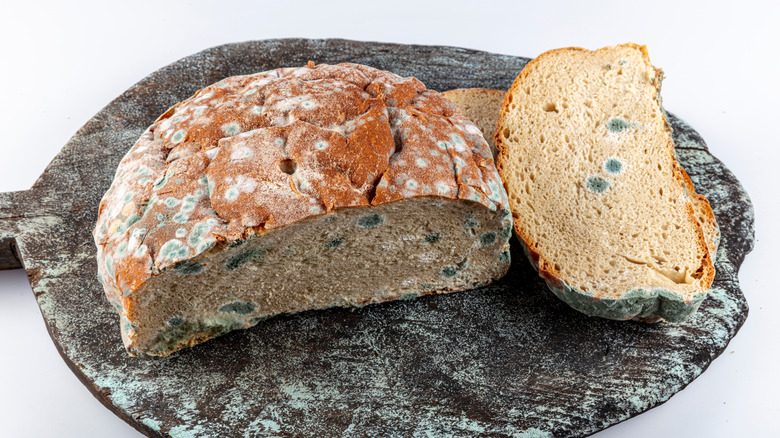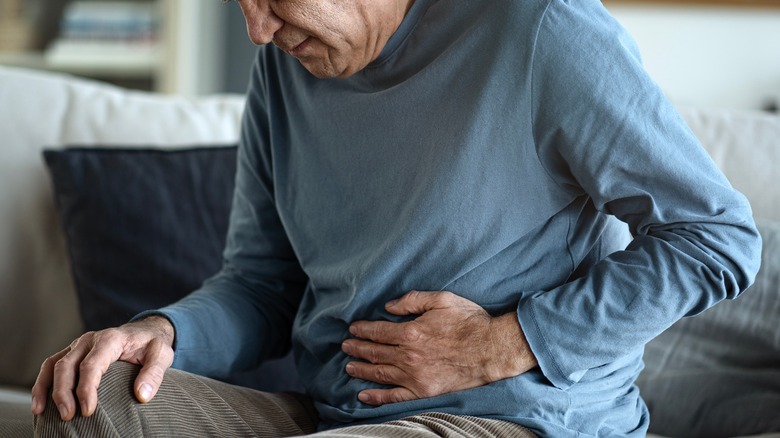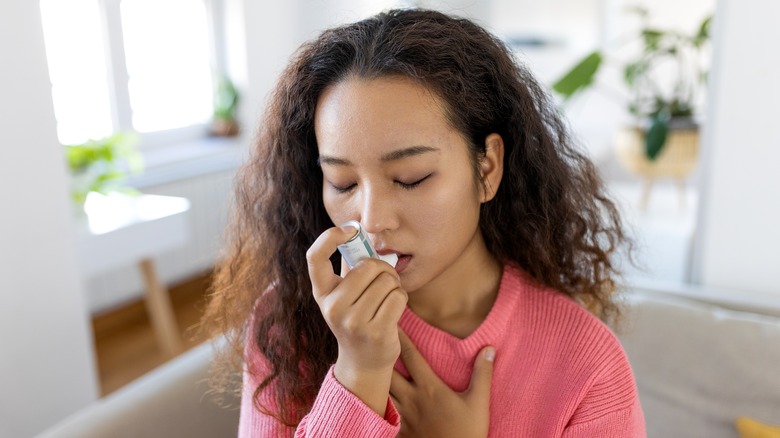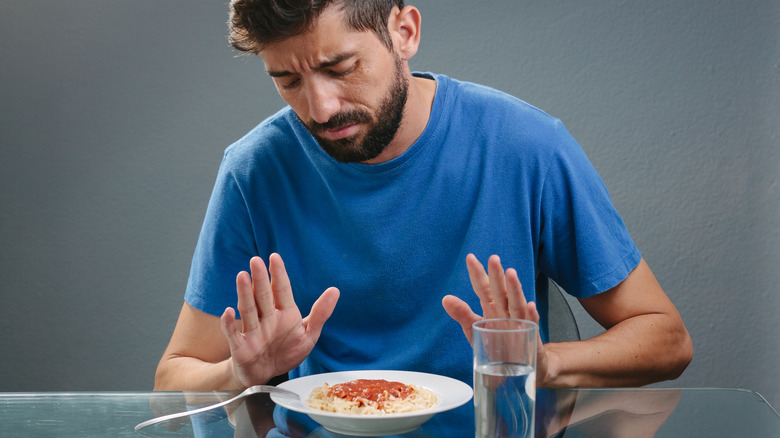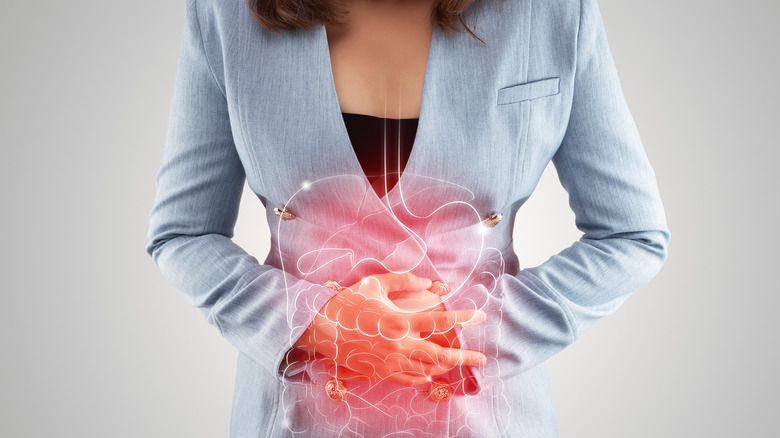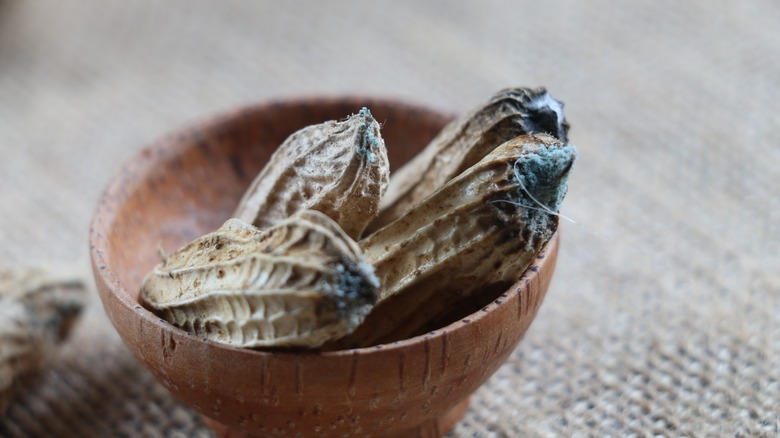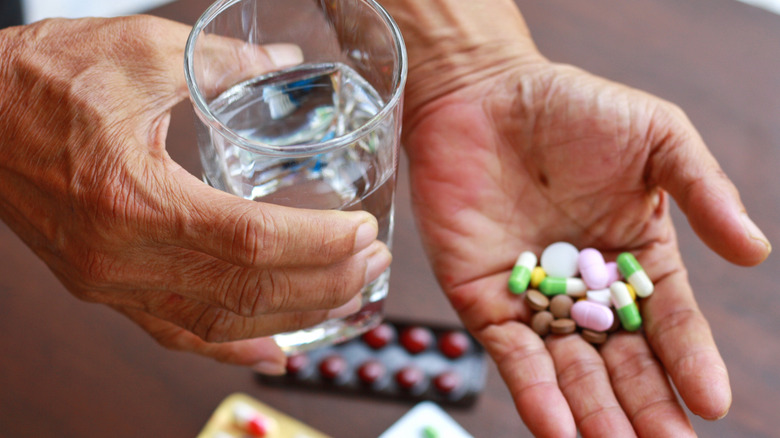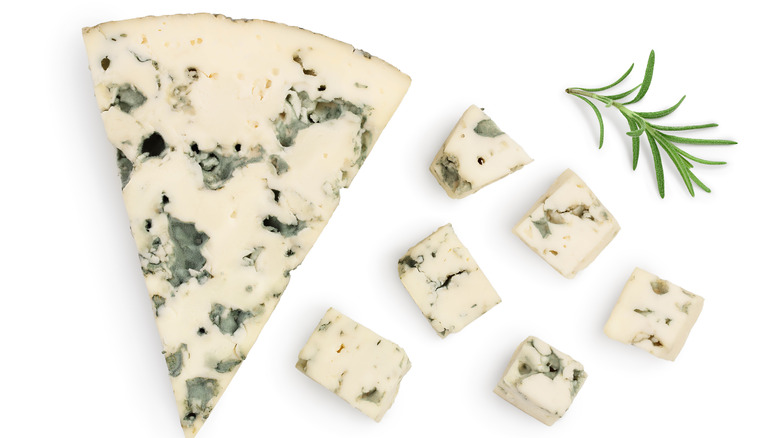10 Things That Could Happen If You Accidentally Eat Mold
We've all been there at some point — you take a big bite of food and think, "Huh, what's that taste?" It takes a few seconds before it dawns on you: You've just eaten mold. Your first reaction is likely disgust, you may even spit it out. But then what? Your mind may start racing, wondering how likely it is that you will become sick. And you don't know if you should throw out the rest of the food or just cut off the mold you can see and hope for the best.
The issue is that the dangers involved with mold go far beyond the off-putting taste and initial sense of disgust. Depending on the type of mold, it could be relatively harmless or might cause serious illness, either in the short or long term. And it may surprise you to know that dried foods need just as much attention as fresh foods do when preventing the growth of mold. Read on to discover what precautions you should take to keep the balance between wasting perfectly good food and becoming sick.
You may feel you have an upset stomach
The first reaction that you're likely to have upon discovering you have eaten moldy food is to feel that something may not be right in your stomach. This can manifest in various ways, including nausea, vomiting, diarrhea, and stomach cramps. These symptoms are the body's reaction to the mold as a foreign substance — working hard to show it the door.
Whenever you eat or absorb something your body considers to be unwanted, the immune system will spring into action to put things right. Since the immune system involves the gut microbiome, gastrointestinal symptoms can occur. Some toxins in mold can hurt your gut flora, leading to longer-term digestive issues, but the stomach is a very acidic environment, meaning that most microorganisms will find it difficult to survive.
If you do experience some digestive discomfort after eating mold, there is no need to worry. The symptoms are likely to be fairly mild and will pass quickly. In the highly unlikely event that your symptoms persist and you feel very unwell, contact a doctor who can prescribe medication. If you have a sensitive stomach or are prone to regular nausea, you may find these symptoms happen whenever you consume moldy food, meaning you should take precautions to avoid food going moldy in the first place.
You could have an allergic reaction
One serious result of eating moldy food could be an allergic reaction. In the same way that you can be allergic to dust, pollen, or dairy, some individuals can be allergic to mold and may not even be aware of it. An allergic response can range in severity from barely noticeable to needing immediate medical treatment.
Often, the signs of mold allergies can mimic asthma symptoms, and those with asthma may be more likely to react to mold. Likely symptoms of an allergic reaction to mold include nasal congestion, wheezing, a skin rash, and, in extreme cases, difficulty breathing.
Since the antibiotic penicillin was originally made from mold, some people may worry that an allergy to antibiotics could be triggered by eating moldy food. Thankfully, this is not the case, as no link has been found between an allergy to mold and an allergy to the antibiotic penicillin.
If you already have allergy-related conditions such as asthma, hay fever, or food intolerances, avoiding accidentally ingesting mold from food is essential. Though many people believe that simply cutting the mold off the food and eating the rest will prevent this issue — for most foods, this is not the case. In soft foods, particularly, the fungus can spread through the food and still be harmful even when the visible mold has been removed. Don't take the chance — throw the whole thing in the bin just to be sure.
It may cause anxiety over food
As well as the physical issues that eating moldy food may cause, realizing you have accidentally consumed mold can impact your mental health, causing longer-term food anxiety. This goes beyond the immediate disgust and worry over becoming ill and can reduce confidence in making safe decisions about food.
Over time, this anxiety can escalate into food-related obsessive-compulsive disorder, which can significantly impact your life. Those with food-related OCD can scrutinize everything they eat — obsessively checking expiration dates, washing food unnecessarily, and, in some cases, avoiding eating food outside their home.
The microorganisms in moldy food can sometimes cause anxiety themselves. Mycotoxins are a type of neurotoxin found in mold and have been shown to affect the brain, reducing dopamine levels, which can cause low mood and anxiety. While mycotoxins are more commonly found in black mold rather than moldy food, certain dried produce such as nuts, dried fruit, and coffee beans can harbor this dangerous substance. Prolonged exposure to mycotoxins, either from your environment or food, can have a cumulative effect and end up messing with your brain chemistry and impacting your mental health.
If you have experienced anxiety or OCD in the past, it is crucial that you avoid accidentally eating moldy food. Take steps to keep food as fresh as possible by stocking your refrigerator well and throwing out food that has been stored incorrectly. By preventing moldy food in the first place, you can avoid triggering food anxiety, ensuring your relationship with food remains a positive one.
It could cause an IBS flare-up
Eating moldy food can have a more pronounced effect on some people, particularly those who already have irritable bowel syndrome. IBS is a chronic condition of the gut, and symptoms include abdominal cramps, bloating, and constipation. It is triggered by certain foods, including processed food and caffeine, and mold is also considered to be another potential aggravator.
The gut of those with IBS is already more sensitive, meaning that adding moldy food into the mix is going to exacerbate the situation. A healthy gut contains trillions of microbes; keeping them balanced is the key to optimal gut health. Useful microbes in the gut have the ability to bind to any mycotoxins that may be present in moldy food, preventing them from reaching the small intestine. Those with IBS tend to have overwhelming numbers of 'bad' gut flora, resulting in gastrointestinal discomfort and reducing their ability to deal with mold from food successfully.
If you suffer from IBS or regular gastrointestinal discomfort and have eaten moldy food, you may wish to take a probiotic supplement for a few days to prevent symptoms from worsening. This will replenish beneficial bacteria in the gut and reduce the impact of any mycotoxins.
It can cause respiratory symptoms over time
While you may assume that side effects of eating mold would be restricted to the digestive system, they can sometimes expand to the respiratory system, especially with long-term exposure. Mold contains spores and toxins that are detrimental to the respiratory system in large numbers, meaning that symptoms are unlikely to appear immediately, but continued exposure to mold from your environment or food can cause a gradual onset of respiratory issues.
The symptoms could be easily mistaken for a cold or hay fever to begin with, including coughing and nasal congestion, but as they progress, they may start to resemble more serious breathing issues such as bronchitis and asthma. If you have a pre-existing respiratory condition, such as chronic lung disease or a suppressed immune system, mold exposure can be extremely serious. Though most healthy individuals are unlikely to be hospitalized from exposure to mold through food, those with underlying conditions should take moldy food very seriously.
Those at risk must be especially vigilant about preventing food from spoiling by keeping track of expiration dates, storing items correctly, and discarding food that shows even the slightest sign of mold since breathing in mold while handling spoiled food can also create issues.
There is a small risk of mycotoxin poisoning
Most types of mold present in spoiled food are unlikely to cause long-term issues for those in good health, but there is one type of mold that is more dangerous. Mycotoxins are harmful substances that are produced by certain types of mold, including those that grow on pantry nuts, spices, and cereals, and can cause serious health risks when ingested or inhaled.
Immediate mycotoxin poisoning can result in gastrointestinal pain, vomiting, and, in some cases, fatal liver damage. Although severe, this type of mycotoxin poisoning is rare since it results from exposure to a high quantity of mold. A more concerning likelihood is long-term mycotoxin exposure, which can lead to chronic illnesses, including autoimmune conditions and cancer.
The good news is that mycotoxins rarely grow on food that is properly stored and kept dry. Reduce your chances of getting ill by paying as much attention to the condition of your dried food as your fresh food. This means storing susceptible produce in airtight containers in a cool, dry space and keeping them within their expiration date. Be sure to visually inspect dried food before using it, and discard it if any spoilage is visible.
Vulnerable people could get an infection
As well as the more common symptoms of upset stomachs and respiratory symptoms, eating moldy food can lead to an infection in vulnerable people. Those with weakened immune systems are more at risk of most diseases, including the chance of complications from seemingly innocuous mold.
In a person with a fully functioning immune system, the body has an efficient method of tackling the pathogen that could lead to infection, meaning they are unlikely to become ill. In the case of an immunocompromised individual, the immune system will be weaker and often low in white blood cells, which are crucial for fighting infection. In the absence of a strong immune system, infection can develop quickly, meaning it may take a long time to recover.
Immunocompromised people include those undertaking cancer treatments such as chemotherapy and radiotherapy, transplant recipients, those with type 1 diabetes, and those with certain chronic diseases such as lupus and rheumatoid arthritis. Possible infections can range from respiratory issues like pneumonia to whole-body infections such as sepsis.
If you fall into one of these categories or cook for someone who does, it is imperative to check all food before preparing and serving and to discard anything that could cause an issue immediately. For vulnerable people, never cut off the mold and serve the rest of the food, as there could be some nasty pathogens lurking beneath the surface.
You may develop a chronic disease over time
Though you may expect that any symptoms of eating moldy food will disappear within a few days, it is actually possible that continued exposure to mold can cause long-term illness, with a number of chronic diseases being related to mycotoxins. Although this is much more likely to happen when exposed to environmental molds, such as living in a house with dampness, mold from food can contribute to the risk, particularly with frequent ingestion over a period of time.
Mycotoxins, found in certain moldy foods, can lead to a variety of chronic health issues through long-term exposure. The toxins can accumulate in vital organs and cause life-altering conditions such as kidney failure and liver disease. Since these organs are responsible for removing toxins from the body, continued exposure to mold will make their jobs increasingly difficult, leading to various potential health problems in the long term.
Studies have also shown that repeated exposure to mycotoxins can have profound neurological effects, causing symptoms similar to multiple sclerosis. To prevent the chances of chronic disease from mold exposure, practice good food hygiene, particularly with dried foods that are more likely to contain mycotoxins. This includes keeping foods in a cool, dry storage area and checking your stock regularly for signs of spoilage.
It could cause issues in pregnant women, children, and the elderly
There are some groups where even perfectly healthy individuals must be careful when it comes to potentially eating moldy food. People within this category are at a higher risk of illness than the general population and could become seriously ill.
For pregnant women, moldy food could pose a risk to both their health and that of their unborn baby. As in most cases, mycotoxins are the biggest risk and can cross the placental barrier, potentially leading to complications. Mycotoxin poisoning can lead to stunted growth, increased risk of miscarriage, stillbirth, and preterm birth.
The immune system weakens during pregnancy to prevent the body from attacking the fetus, so the chances of getting sick in pregnancy are increased across the board. This means the chances of becoming unwell through mold exposure are also increased. Pregnant women should not take any chances with moldy food, throwing away any produce that may be past its best.
Young children have an increased risk due to their bodies (and therefore organs) still developing, meaning they cannot detoxify as easily as adults. Exposure to mycotoxins from food can lead to respiratory issues and, in some cases, can affect growth and development.
In elderly individuals, with their reduced immune function, the likelihood of a serious reaction to toxins in food is increased. The chance of infection is higher, and the ability to recover quickly will be diminished. This demographic's poorer ability to detoxify means they are less able to eliminate toxins from the food, leading to a higher chance of illness.
It could be good for you
Though the concept of eating mold is generally considered to be a negative thing, there are certain molds in food that are not dangerous and can be downright delicious. Mold is an important ingredient in the production of some foods, including cheese and soy sauce.
The most famous example of this is blue or mold-ripened cheese, which relies on fungi to create its distinctive flavor and texture. The mold that is injected into cheeses such as stilton and Roquefort (Penicillium roqueforti) is chosen especially to impart the classic 'blue' flavor into the cheese. The mold breaks down the protein and fat to create a sharp, tangy flavor and pleasant texture. The mold used to make blue cheese cannot produce mycotoxins, making these cheeses safe to eat for the majority of people. In fact, eating blue cheese can actually introduce a variety of beneficial microorganisms into your gut, helping to maintain a healthy microbiome.
Pregnant women and young children are still advised to avoid these foods as there is a chance of listeria being present. It is worth noting that while these cheeses are safe to eat when fresh, they can still spoil and produce unsafe toxins in the same way as other foods, so be sure to check the expiration dates and discard any cheese that looks or smells past its best.

